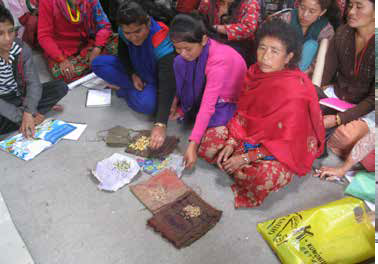
Description of the project: The project aims at empowering indigenous women and securing their rights after natural disasters by helping them practice resilient farming. In the Thami and Bankaria indigenous communities, women groups have built their capacity via trainings on soil testing, selecting and preserving seeds, maintaining plant nurseries, preparing organic fertiliser, using integrated pest management, and selling vegetables in farmers’ markets. Envisioned with a sustainable, rights based approach, this project has empowered marginalised women and communities to rebuild their livelihoods after the devastating earthquake.
Climate impact: The project helps decrease GHG emissions through ecological techniques such as the production and use of organic fertilizer from household waste and the production and use of organic pesticides from local plants and vegetables. Integrated Pest Management (IPM) is an ecosystem-based strategy that focuses on the long-term prevention of pests through a combination of methods: biological control, habitat manipulation, modification of cultural practices, and use of resistant varieties.
Gender impact: This project aims to improve the economic status of marginalised indigenous women. Their consent was prioritized and their multiple workloads kept in mind before conducting any activities. To ensure equal access to benefits, Women Farmers Groups were established to keep useful savings. The shared knowledge on indigenous women’s human rights and collective rights boosted the trainees to self-advocate for their rights as women, wives, daughters, sisters, and mothers.
Scalability / replicability: This project has been a great success in bringing change in the lives of Thami indigenous
women of Dolakha, Bankariya and indigenous women of Hadikhola. Now they are fully engaged in agriculture based on IPM, a cost effective natural technique. To replicate this project, interested communities can visit the Thami and Bankariya from Dolokha and Makwanpur to observe and understand the importance of this simple, climate friendly technique of vegetable farming.